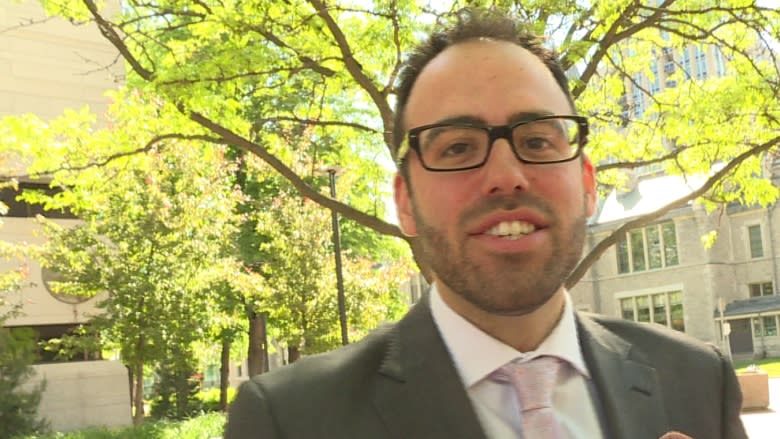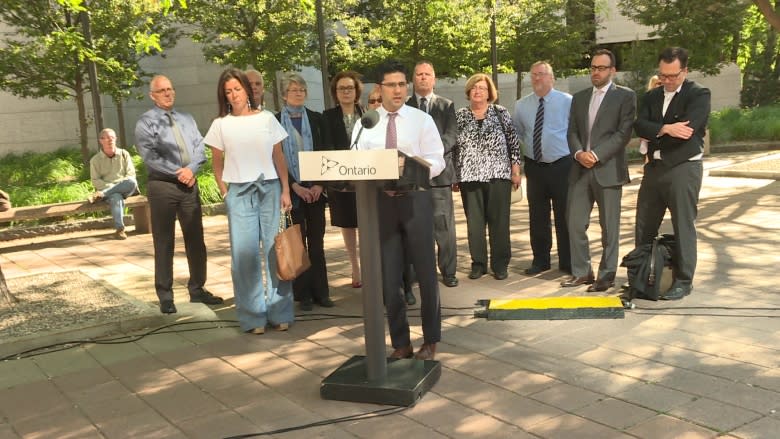Bail system remains divisive issue in Ottawa jail reform
Yasir Naqvi, minister of community safety and correctional services, chose the Ottawa Court House as the backdrop to discuss a new plan to fix Ottawa's beleaguered jail.
To some, the backdrop was an acknowledgement that repairing the problems at the Ottawa Carleton Detention Centre could also mean changes to choices and mechanisms used by the police, Crown attorney's and the justice system in Ontario.
Criminal defence lawyer Solomon Freidman, who sat on the OCDC task force, says the report speaks directly to problems in the bail system — an issue that falls under the responsibility of Ontario's courts and Attorney General.
"There are 14 recommendations that deal directly with bail," said Freidman.
"For the first time we're recognizing a strong, real link between the overuse of sureties and conditions and the overcrowding in our provincial institutions. If we don't recognize that bail is a problem, we can't possibly start to address it."
Meilleur welcomes recommendations
Attorney General Madeline Meilleur said Wednesday she welcomes the recommendations that fall under the responsibility of her department.
"We have already taken action to address bail and remand issue at the OCDC," said Meilleur who added a six-month pilot project is already underway in Ottawa.
She said right now, for example, as cases come in, crown prosecutors provide bail advice to police, 24 hours a day, seven days a week.
But the fixes to the system won't come quickly or easily. Not all the people who sat on the task force to come up with the 42 recommendations agree on either the problems or the fix.
Crown lawyer said reforms should await bail study
Crown Attorney Vikki Bair, who also sat on the task force, was reluctant to acknowledge the connections between overcrowding at the jail and the bail process, and she noted the adversarial opinions between Crown and defence lawyers should be obvious.
"My responsibility is public safety, their responsibility is supporting the accused," said Bair. "We can't just chose to address overcrowding by abandoning our fundamental responsibility to the community."
Bair said there's a separate, provincial bail study currently underway, and she said no changes should be considered before that study is complete.
"Let's just wait and see what the bail analysis tells us about what the real reasons for the increase in the remand population are before you ask me questions based on other people's assumptions I don't accept at this moment."
Minister Naqvi will need to balance these opposing views if he hopes to implement the recommendations laid out in the task force's report.
'It's a complex problem'
He also acknowledged that bail reforms can't happen without other partners, including the Ontario Ministry of the Attorney General and the federal government.
"I think it's clear, when you look at the report in detail, there are multiple players and actors involved in the solutions.
"It's a complex problem because it's a very elaborate system," said Naqvi. "Some of the recommendations do speak to the role of the judiciary."
Justin Piché, a criminology professor at the University of Ottawa and member of the Criminalization and Punishment Education Project — which made submissions to the Task Force — said he's optimistic when it comes to the proposed measures, such as an increasing use of bail supervision in place of pre-trial detention.
He said these are "important components of a series of many other actions that need to take place in concert with the Ontario Ministry of the Attorney General and the Minister of Justice and Attorney General of Canada."





